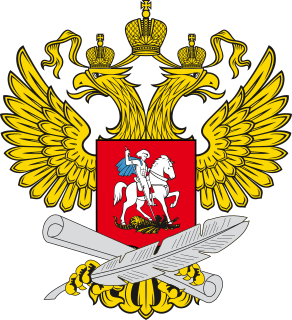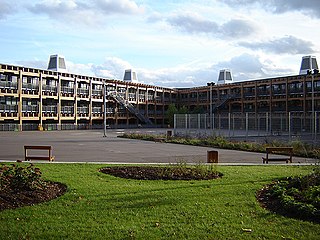
Vocational education is education that prepares people to work as a technician or to take up employment in a skilled craft or trade as a tradesperson or artisan. Vocational education is sometimes referred to as career and technical education.
Education in England is overseen by the United Kingdom's Department for Education. Local government authorities are responsible for implementing policy for public education and state-funded schools at a local level.
Education in Greece is centralized and governed by the Ministry of Education and Religious Affairs at all grade levels. The Ministry exercises control over public schools, formulates and implements legislation, administers the budget, coordinates national level university entrance examinations, sets up the national curriculum, appoints public school teaching staff, and coordinates other services.

In Russia, the state provides most education services regulating education through the Ministry of Education and Science. Regional authorities regulate education within their jurisdictions within the prevailing framework of federal laws. Russia's expenditure on education has grown from 2.7% of the GDP in 2005 to 3.8% in 2013, but remains below the OECD average of 5.2%.

Language Colleges were introduced in 1995 as part of the specialist schools programme in the United Kingdom. The system enabled secondary schools to specialise in certain fields, in this case, modern foreign languages. Schools that successfully applied to the Specialist Schools Trust and became Language Colleges received extra funding for language teaching from this joint private sector and government scheme. Language Colleges act as a local point of reference for other schools and businesses in the area, with an emphasis on promoting languages within the community. They are also encouraged to develop links with schools and other institutions in foreign countries. There were 216 Language Colleges in the country by 2010.

The specialist schools programme (SSP) was a government programme in the United Kingdom which funded primary and secondary schools in England, Scotland and Northern Ireland to designate as specialist schools – schools that specialise in certain areas of the curriculum – to boost achievement. The programme was introduced under Prime Minister John Major's Conservative government through the Education Act 1993 and was further expanded upon by Tony Blair and Gordon Brown's New Labour governments. The Specialist Schools and Academies Trust (SSAT) was responsible for the delivery of the programme. The scheme ended in 2011 in favour of mainstreamed specialist school funding, by which time there were only 80 unspecialised state-secondary schools in England, with 96.6% of them having specialised.

An academy school in England is a state-funded school which is directly funded by the Department for Education and independent of local authority control. The terms of the arrangements are set out in individual Academy Funding Agreements. Most academies are secondary school. However, slightly more than 25% of primary schools, as well, as some of the remaining first and middle schools, are also academies.

Plymouth College of Art, formerly known as Plymouth College of Art and Design, is an independent university-sector Higher Education (HE) provider located in Plymouth, Devon UK. In April 2019 the specialist college was awarded taught degree awarding powers (TDAP) by the Quality Assurance Agency for Higher Education (QAA) granting the creative institution the authority to award and accredit its own BA (Hons) degrees and Masters awards.

Business and Enterprise Colleges (BECs) were introduced in 2002 as part of the Specialist Schools Programme in England. The system enabled secondary schools to specialise in certain fields. Schools that successfully applied to the Specialist Schools Trust and became Business and Enterprise Colleges received extra funding for applied business teaching from this joint private sector and government scheme. Business and Enterprise Colleges act as a local point of reference for other schools and businesses in the area, with an emphasis on promoting enterprise and commercial awareness within the community.
Haybridge High School and Sixth Form is an 11–18 mixed academy school with approximately 1,250 students in Hagley, Worcestershire, England, United Kingdom, serving North West Worcestershire and the West Midlands. The school is a Technology College, with the two additional specialisms of Applied Learning and Sports. It is also a Training School and a Leading Edge School.

Tyne Metropolitan College is a college of further education in North Tyneside, England.

Wilmington Academy is a mixed secondary school located in Wilmington, Kent in the United Kingdom. It stands next to the site of Wilmington Hall.

An Arts College in the United Kingdom is a type of specialist school that can specialise in the subject fields of the performing, visual, digital and/or media arts. Its creation was announced in 1996 and it was introduced alongside Sports Colleges to England in 1997, being one of the five "practical specialisms" of the specialist schools programme. They were then introduced to Scotland in 2005 and Northern Ireland in 2006. Arts Colleges are entitled by the School Standards and Framework Act 1998 to select 10% of its yearly pupil intake based on academic aptitude, however this partial selection is optional.

Woodham Academy is often simply referred to as Woodham and is an 11–16 mixed secondary school with academy status in Newton Aycliffe, County Durham, England. It was formerly a foundation school that was established in 1970 and adopted its present name after becoming an academy in 2012. The school is part of the Eden Learning Trust.

Chamberlayne College for the Arts is a secondary school in Weston, Southampton, providing education for around 900 boys and girls aged between 11 and 16. The school also specialises in the Arts.

Sports Colleges are senior secondary schools which promote sports alongside secondary education.

City and Islington College (CANDI) is a further education college in the London Borough of Islington, England, established in 1993. The college has four major centres throughout the borough, including a dedicated sixth form centre. It is part of Capital City College Group, alongside Westminster Kingsway College and The College of Haringey, Enfield and North East London, which altogether have 25,000 students in 2020.
Braintree Sixth Form is a school Sixth Form centre for educating 16- to 19-year-olds in Braintree, Essex, England. It is located approximately 15 miles east of Stansted Airport in north Essex.

A specialist school, also called a specialist college, is a type of school or sixth form in the United Kingdom, usually a secondary school, that specialises in a certain field of curriculum. Specialist schools receive additional funding from sponsors and/or the government to a varying degree. These funds are then used to expand the provision and facilities of selected specialist subject areas, known as "specialisms". Three of the four constituent countries of the United Kingdom have – or have had – specialist schools, with the one exception being Wales.

SEN Colleges, also known as Special Specialism Colleges, are specialist special schools in the United Kingdom. They were introduced in 2006 as part of the specialist schools programme following a successful trial in 2004. The system enabled secondary and primary schools to specialise in certain fields. Specialist SEN Colleges were special schools that successfully applied to the Specialist Schools Trust, receiving extra funding from this joint private sector and government scheme. The first non-trial SEN Colleges were introduced in September 2006 after an announcement by Andrew Adonis in 2005 and could specialise in four areas:
















